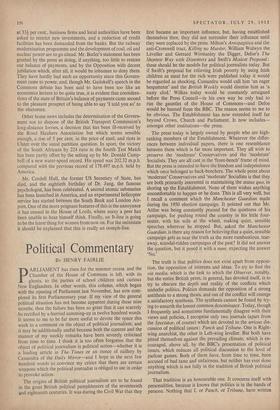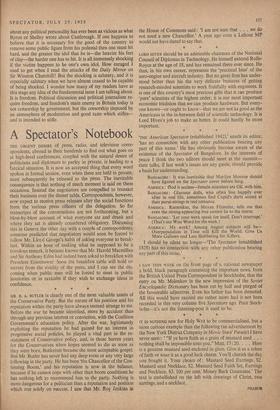Political Commentary
BY HENRY FAIRLIE pARLIAMENT has risen for the summer recess. and the Chamber of the House of Commons is left, with its ghosts. to the parties of school children and curious New Englanders. In other words, this column, which began with the opening of Parliament last November, has now com- pleted its first Parliamentary year. If my view of the general political situation has not become apparent during these nine months, then the failure has been so great that it can scarcely be rectified by a hurried summing-up in twelve hundred words. It seems to me to be far more useful to devote the space this week to a comment on the object of political journalism; and it may be additionally useful because both the content and the manner of my weekly remarks have been severely criticised from time to time. I think it is too often forgotten that the object of political journalism is political action—whether it is a leading article in The Times or an ounce of raillery by Cassandra of the Daily Mirror—and I hope in the next few hundred words to convince my critics that there are certain weapons which the political journalist is obliged to use in order to provoke action.
The origins of British political journalism are to be found in the great British political pamphleteers of the seventeenth and eighteenth centuries. It was during the Civil War that they first became an important influence, but, having established themselves then, they did not surrender their influence until they were replaced by the press. Milton's Areopagitica and the anti-Cromwell tract, Killing no Murder, William Walwyn the Leveller and Gerrard Winstanley the Digger, Defoe's The Shortest Way with Dissenters and Swift's Modest Proposal: these should be the models for political journalists today. But if Swift's proposal for relieving Irish poverty by using Irish children as meat for the rich were published today it would be regarded as shocking. Cassandra would call him 'an eager bespatterer' and the British Weekly would dismiss him as 'a nasty clod.' Wilkes today would be constantly arraigned before the Press Council—in his own way he only had to run the gauntlet of the House of Commons—and Defoe would be banned from the BBC. The reason seems to me to be obvious. The Establishment has now extended itself far beyond Crown, Church and Parliament. It now includes— amongst other institutions—the press.
The press today is largely owned by people who are high- ranking members of the Establishment. Whatever the differ- ences between individual papers, there is one resemblance between them which is far more important. They all wish to preserve the 'moderate' Conservatives and the 'moderate' Socialists. They are all cast in the 'front-bench' frame of mind. But the press is intended to have the freedom and independence which once belonged to back-benchers. The whole point about `moderate' Conservatives and 'moderate' Socialists is that they are both primarily interested in maintaining the status quo, in shoring up the Establishment. None of them' wishes anything uncomfortable to happen or be done. This is all very well, but I recall a comment which the Manchester Guardian made during the 1950 election campaign. It pointed out that Mr. Attlee was being constantly praised for the quietness of his campaign, for pushing round the country in his little four- seater, with his wife at the wheel, making quiet, sensible speeches wherever he stopped. But, asked the Manchester Guardian, is there any reason for believing that a quiet, sensible campaign gets as near the truth as the more rumbustious, tear- away, scandal-ridden campaigns of the past? It did not answer the question, but it posed it with a nun, expecting the answer `N o.'
The truth is that politics does not exist apart from opposi- tion, the opposition of interests, and ideas. To try to find the via media, which is the task to which the Observer, notably, but the entire British press, in general, has devoted itself, is to try to obscure the depth and reality of the conflicts which underlie politics. Politics demands the opposition of a strong antithesis to a strong thesis, and out of the conflict will emerge a satisfactory synthesis. The synthesis cannot be found by try- ing to unearth the lowest common denominator. Today, though I frequently and sometimes fundamentally disagree with their views and policies, I recognise only two journals (apart from the Spectator, of course) which are devoted to the serious dis-, cussion of political issues : Punch and Tribune. One is Right- wing anarchist, the other is Left-Wing leveller. But both have pitted themselves against the prevailing climate, which is en- couraged, above all, by the BBC's presentation of political issues, which reduces all political discussion to the level of parlour games. Both of them have, from time to time, been accused of bad taste and unfairness, but neither has ever done anything which is not fully in the tradition of British political journalism.
That tradition is an honourable one. It concerns itself with personalities, because it knows that politics is in the hands of persons. Nothing that I, or Punch, or Tribune, have written about any political personality has ever been as vicious as what Byron or Shelley wrote about Castlereagh. If one happens to believe that it is necessary for the good of the country to remove some public figure from his pedestal then one must hit hard, and the greater the idol that he is—the heavier his feet of clay—the harder one has to hit. It is all immensely shocking if the victim happens to be one's own idol. How enraged 1 used to get when I read the attacks of the Daily Mirror on Sir Winston Churchill! But the shocking is salutary, and it is especially salutary when we have almost ceased to be capable of being shocked. I wonder how many of my readers have at this stage any idea of the fundamental issue I am talking about. It is freedom. Political discussion and political journalism re- quire freedom, and freedom's main enemy in Britain today is not censorship by government, but the censorship Unposed by an atmosphere of moderation and good taste which stifles— and is intended to stifle.



































 Previous page
Previous page